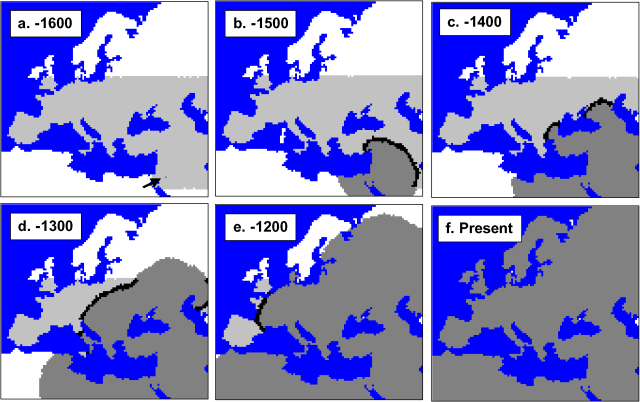Not true, everything you've posted here is "idiotic." ;-)
Here is a summary of recent years DNA findings:
- "On 16 November 2006, Lawrence Berkeley National Laboratory issued a press release suggesting Neanderthals and ancient humans probably did not interbreed...."
"In 2008 Richard E. Green et al. from Max Planck Institute for Evolutionary Anthropology in Leipzig, Germany published the full sequence of Neanderthal mitochondrial DNA (mtDNA) and suggested 'Neanderthals had a long-term effective population size smaller than that of modern humans.'[64]
Writing in Nature about Green et al.'s findings, James Morgan asserted the mtDNA sequence contained clues that Neanderthals lived in 'small and isolated populations, and probably did not interbreed with their human neighbours.' "
"...However, an analysis of a first draft of the Neanderthal genome by the same team released in May 2010 indicates interbreeding may have occurred.[4][5]
'Those of us who live outside Africa carry a little Neanderthal DNA in us,' said Pääbo, who led the study.
'The proportion of Neanderthal-inherited genetic material is about 1 to 4 percent.
It is a small but very real proportion of ancestry in non-Africans today,' says Dr. David Reich of Harvard Medical School in Boston, who worked on the study.
"This research compared the genome of the Neanderthals to five modern humans from China, France, sub-Saharan Africa, and Papua New Guinea.
The finding is that about 1 to 4 percent of the genes of the non-Africans came from Neanderthals, compared to the baseline defined by the two Africans.
This indicates a gene flow from Neanderthals to modern humans, i.e., interbreeding between the two populations.
"Since the three non-African genomes show a similar proportion of Neanderthal sequences, the interbreeding must have occurred early in the migration of modern humans out of Africa, perhaps in the Middle East.
No evidence for gene flow in the direction from modern humans to Neanderthals was found.
The latter result would not be unexpected if contact occurred between a small colonizing population of modern humans and a much larger resident population of Neanderthals.
"A very limited amount of interbreeding could explain the findings, if it occurred early enough in the colonization process"
Expansion of human populations into Europe beginning around 1,600 generations ago = approx 40,000 years:


